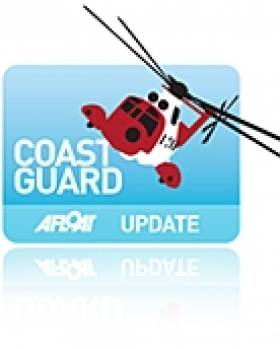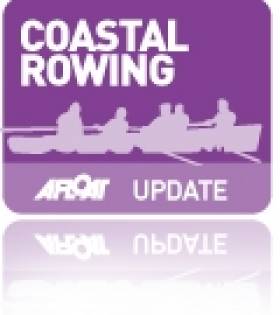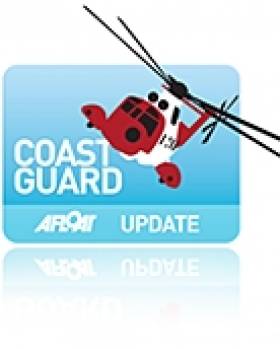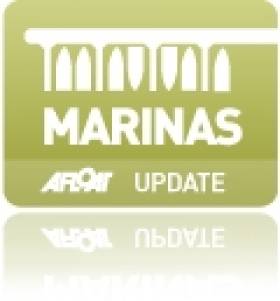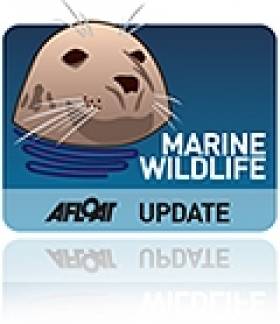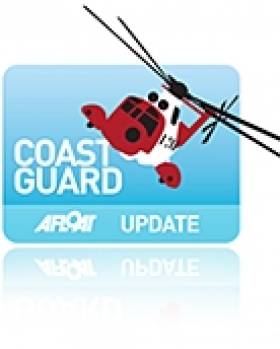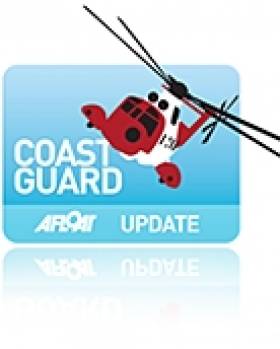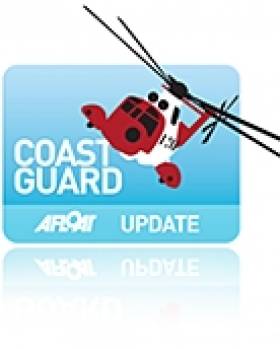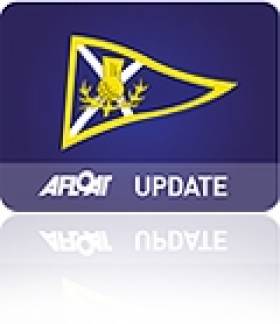Displaying items by tag: Scotland
Belfast Coastguard Manager Resigns As Station Takes On Extra Load
#Coastguard - For Argyll in Scotland reports that Richard Newell has resigned from his post as rescue co-ordination centre manager at Belfast Coastguard.
The news comes some weeks after the command base took on extra responsibility with the permanent closure of the Clyde coastguard station last month.
Britain's Maritime and Coastguard Agency (MCA) confirmed to the website that Newell resigned from his position around two weeks ago - and that he has assured the agency that his decision has no connection with the streamlining plans being undertaken across Britain's coastguard network.
However, For Argyll alleges Newell had made it known locally that "if he considered the future [of the coastguard service] was becoming dangerous, then he would go".
As previously reported on Afloat.ie, campaigners for the Clyde coastguard station in western Scotland were taken aback by the early transfer of helicopter dispatches to Belfast and Stornoway in November, ahead of the base's permanent closure on 18 December last.
More than 30 jobs were lost with the scrapping of the Clyde control centre at Greenock, with much of its role now being taken up by the Belfast command centre at Bangor across the North Channel - a change to the original plan for Scottish stations to share the load till 2015.
Flatpack Coastal Rowing Skiff Is All The Rage
#CoastalRowing - News comes from Scotland of an intriguing new coastal rowing craze that sounds like something from a Swedish furniture store!
As the Guardian reports, a traditional Scottish fishing skiff design provided the inspiration for the new flatpack coastal rowing boat, which began life as a prototype project for the Scottish Fisheries Museum four years ago.
Since then the St Ayles skiff concept swept like a wave across the UK and beyond - and examples of the DIY kit row boat, which is handmade in Fife, can be found as far afield as Australia.
Many of those international rowers are expected to converge in Scotland this simmer for the coastal rowing world championships off Ullapool.
The Guardian has much more on the story HERE.
Mike Balmforth FRIN 1941-2012
#mikebalmforth – With the death on 2 December of Mike Balmforth, Ireland and Scotland lost a powerful voice for leisure sailors.
Mike was born in Belfast and learned to sail on Strangford Lough. He became a deputy editor of Yachting Monthly in the 1960s, and went on to be boatbuilder, sparmaker, yachtbroker and chandler, and marine author, editor and publisher. He edited the Clyde Cruising Club's Journal and founded The Yachtsman's Almanac and Welcome Anchorages.
Mike co-founded the Scottish Boating Alliance, which allowed marine leisure interests to speak with one strong voice to Government. His knowledge, vision, administrative skills and ability to inspire trust gave him and the SBA great authority, and the model he developed has been recommended for marine leisure development planning in Ireland.
He was a member of the Irish Cruising Club for 46 years, and made a major contribution as a director of the Club's publications arm and co-author of Cruising Ireland.
He had many boats of his own, but his masterpiece was his beautiful Dawn 39 Greenheart, which he fitted out himself from the mouldings. With his family – all dedicated sailors - he cruised Scotland, Ireland, France, Spain and the Baltic.
Mike is survived by his wife Alison, sons Robin and Des, and three grandchildren.
NBK
'Early Closure' of Clyde Coastguard Surprises Campaigners
#COASTGUARD - Campaigners for the Clyde coastguard station in western Scotland have suffered a blow with the news that all calls are now being routed to Stornoway and Belfast as of last night.
BBC News reports on a document leaked to the Coastguard SOS Campaign, which outlines that while the Clyde station itself is scheduled to close on 18 December, control of aerials (ie helicopter dispatches) to the stations at Stornoway and Belfast was on schedule to be completed by yesterday evening (Friday 16 November).
Campaigner Dennis O'Connor said this move meant that "Clyde will cease to exist operationally" from last night.
He also described it as a "direct challenge" to concerns from the Transport Select Committee in Westminster that the closure programme had started early with the closure of Forth coastguard in September "despite assurances that the replacement system of operation would be fully tested before any closures took place".
However, a spokesperson for the Maritime and Coastguard Agency said that the handover period "has been planned for some time. All the staff have been informed well in advance."
As previously reported on Afloat.ie, the scrapping of the Clyde control centre at Greenock will see the loss of 31 jobs, with much of its role being taken up by the Belfast coastguard at Bangor across the North Channel - a change to the original plan for Scottish stations to share the load till 2015.
New Facilities for Stranraer Marina Hoped to Boost Numbers
#MARINAS - The new shore block at Stranraer Marina is the latest project to benefit from the Sail West initiative across western Scotland, Northern Ireland and the northwest coast of Ireland.
As the Galloway Gazette reports, the new waterfront building comprises a permanent harbour office, coastguard base, showers and toilets, as well as a community education room.
“The ongoing development of the marina is key to branding Stranraer as a marine leisure destination," said local councillor Roberta Tuckfield.
"Plans to add more pontoons and another breakwater should bring in additional pleasure craft, increasing tourism numbers benefiting the whole town.”
The marina improvements have been made with the goals of boosting the number of marine leisure users in Stranraer, fitting in with Sail West and its cross-border MalinWaters marine tourism brand across the channel.
Sail West is an international scheme, headed by Donegal County Council and Larne Borough Council, which aims to encourage mariners to enjoy the North Channel coastlines of Scotland, Ireland and Northern Ireland.
Other projects recently supported under the rubric of the Sail West initiative include the new coastal marina facility at Ballycastle Harbour in north Antrim and this summer's Clipper Festival in Derry.
The Galloway Gazette has more on the story HERE.
16 Pilot Whales Die in Scotland Mass Stranding
#MARINE WILDLIFE - Marine wildlife experts are investigaing the causes of a mass stranding of pilot whales at Fife in eastern Scotland at the weekend.
The Press Association reports that 16 whales from a 26-strong group died when they stranded on a beach near St Andrews on the morning of Sunday 2 September. Three of those that died were calves.
More than 50 volunteers assisted members of the RNLI and vets from British Divers Marine Life Rescue (BDMLR) in refloating the other 10 whales at high tide yesterday afternoon, in what BDMLR co-ordinator Ali Jack described as "a fantastic effort".
Rescuers used specialist pontoons brought in from across Scotland as well as Newcastle and Cumbria in northern England.
According to The Guardian, some 24 whales from the same pod were spotted in the shallows further along the coast at Cellardyke and are under close observation.
A Forth coastguard spokesman said that vets would return to the beach this morning to carry out post-mortems on the whale carcasses to find any indication of what might have caused them to come so close to the shore.
The spokesman told The Guardian: "It is a very rare occurrence in Scotland and very sad. The usual scenario would be that the whale that is leading the group has become ill, or has lost its way, and gets beached and the rest will follow on, although we do not know for sure if that is what happened."
The incident brings back memories of last year's mass stranding of 44 pilot whales in the Scottish Highlands, as previously reported on Afloat.ie.
Twenty-five whales from that pod died at the Kyle of Durness, in a tragedy that mirrored the deaths of 33 whales in a similar mass beaching in Donegal in late 2010.
#COASTGUARD - Campaigners opposed to the closure of the Clyde coastguard station in western Scotland will next Friday hold a red flare protest against the UK government's plans.
STV News reports that a flotilla of boats will gather at the Greenock Navy Buildings on the evening of 31 August to release red flares in "a show of thanks for the coastguard for their hard work and dedication", acccording to Save Clyde Coastguard campaign founder John Houston.
He added: "We realise that the centre is going to close. That is a given. It would take a miracle now to have that rescinded by the government."
As previously reported on Afloat.ie, staff at the Clyde station had their hopes of a reprieve dashed after a U-turn on assurances from British Prime Minister David Cameron.
The scrapping of the control centre at Greenock will see the loss of 31 jobs, with future River Clyde rescues being handled from stations around Scotland until 2015, when responsibilty will transfer across the North Channel to the Bangor control centre in Northern Ireland.
Campaigners and staff alike have shown concerns over the loss of local knowledge that could be vital to saving lives in difficult search and rescue operations.
STV News has much more on the story HERE.
Clyde Coastguard Staff Hopes Dashed After U-Turn On Reprieve
#COASTGUARD - Staff at the Clyde coastguard in Scotland have been devastated to learn that their station is still slated for closure after a U-turn on assurances from the British prime minister.
The Lennox Herald reports that David Cameron sent a letter to local campaigners Coastguard SOS which stated that all coastguard stations facing the chop would "remain open until 2015".
Rescue personnel at Clyde - who went on strike in June in protest at the treatened closure of the Western Scottish station - had been celebrating the reprieve until just days later, when the prime minister reversed his position and confirmed that planned closures would go ahead at the end of this year.
The scrapping of the Greenock control centre will see the loss of 31 jobs, with future River Clyde rescues being handled from stations around Scotland until 2015 when responsibilty will transfer across the North Channel to the Bangor control centre in Northern Ireland.
“When the prime minister writes letters like that, you don’t expect them to be wrong," said a spokesperson for Public and Commercial Services (PCS) union representing Clyde staff. “It starts playing havoc with people’s lives.”
The Lennox Herald has more on the story HERE.
#COASTGUARD - Staff from the Clyde coastguard in Scotland will go on strike late tonight in protest at the threatened closure of their station.
As the Clydebank Post reports, the strike in the early hours from 3am to 4am begins a week-long series of walkouts over the British government's plans to streamline the national coastguard network.
As previously reported on Afloat.ie, the control centre at Greenock is set to be scrapped with the loss of 31 jobs, while River Clyde rescues will in future be handled from Northern Ireland.
The Public and Commercial Services (PCS) union, which represents Maritime and Coastguard Agency employees, says that the closure of coastguard units around the UK coastline would result in the loss of local knowledge that may be key to saving lives.
The union's general secretary Mark Serwotka said: "We have always had grave concerns about the government's proposals to cut coastguard stations and staff, and we know this is shared by people in our coastal communities."
Last week campaigners in Merseyside launched an e-petition to stop the closure of Liverpool's search and rescue base, which covers North West England and much of the Irish Sea.
J/97 'Fever' Win Scottish Series in Style
#Scottishseries – Over the 38 years of the Scottish Series there have been few prizegivings where the winners of the overall Scottish Series Trophy have composed a more deserving score-line.
With seven wins from as many starts on Loch Fyne, Grant Gordon and his team on the J/97 Fever Glenfiddich not only won each race in IRC Class 3, but they sailed flawlessly to keep two past winners of the premier regatta's top award behind them. Fever, steered by owner Grant Gordon with Tarbert's Ruairidh Scott as tactician, won their class by 12 points ahead of the identical J/97 of Jim Dick which won the Scottish Series Trophy one year ago.
"As an advertisement for this event and for Scottish sailing I don't think you could ask for more than we have had these past few days. It is has been brilliant," said Gordon who was sailing at his third Brewin Dolphin Scottish Series.
An expatriate Scot who has raced internationally with his Fever team, including winning the Swan 45 European Championships with Scott as tactician, Gordon sailed from the Royal Gourock YC as a youngster, and flew the flag of the Clyde Cruising Club on extended family cruises with their Van de Stadt 49 footer Cinderella. He keeps his boat on the south coast of England but raced at Tarbert with a crew which was 75% Scottish, including several who won the Scottish Series Trophy in 2003 with Scott in his 1720 King Quick.
"This is a team of friends that I can rely on, some from university sailing days, some who we wanted to be here because we know they enjoy it, but we came to have fun and so winning here is great," said Ruairidh Scott. "I am so fortunate to go sailing and racing in nice places around the world but it is really special to come back here and race, and winning here is even better. This regatta has been as good as I can remember. And, yes, we all joke about Loch Fyne from time to time, with spinnakers pointing at each other on the same tack, but the winds this time have been really good and the sunshine fantastic."
The winning crew included Grant Gordon, the owner-driver, Ruairidh Scott, Mike Forster, Charlie Cumbley, Ben Fields, Scott Aikman, Angus Stevenson and Stewart Miller. "I am very proud of this team. It has been really magnificent. They have all worked hard and I am grateful for their contribution," said Gordon.
Scott becomes one of the few sailors to have won the overall trophy three times in the skipper, helm or tactician roles, as skipper helm in 2003 on King Quick, and as tactician on Jump Juice in 2007.
Three times winner Jonathan Anderson and his crew sailed a fitting swansong with Playing FTSE which they won IRC Class 1 with on the Beneteau First 47.7's final race outing in their hands.
"The boat goes well when it is windy and so this really was our kind of regatta," said Anderson who finished two points clear of the Forth crew on Absolutely 2.
John Corson won IRC Class 2 on Salamander 2, the First 35 which he bought from France. Stephen Corson commented, "To be honest we were a little surprised to win the class, we did not know how we would do with a new boat. We came here thinking that if we finished in the top half of the fleet we would be happy. But then we were the fastest around the course under IRC yesterday and so that must mean something."
"Overall we are pleased with the performance of the boat, it has good speed all round, though we were a bit more concerned given that the forecast was for very light winds."
The CYCA cruiser-racer classes enjoyed their passage race based diet of races. Winners of CYCA Class 5, Scott Chalmers on Sunrise summarised, "It is hard to remember better racing than we have had here. Yesterday's was just the best race for a long, long time with a good, long hard beat. And it was so nice to see my young son driving all the way."
The Tarbert Shield for the best CYCA boat in the regatta went to Norman Howison and family on Tartan Pimpernel, while the SB20 one design sportsboat class was won by the Irish visitors on Sharkbait.


























